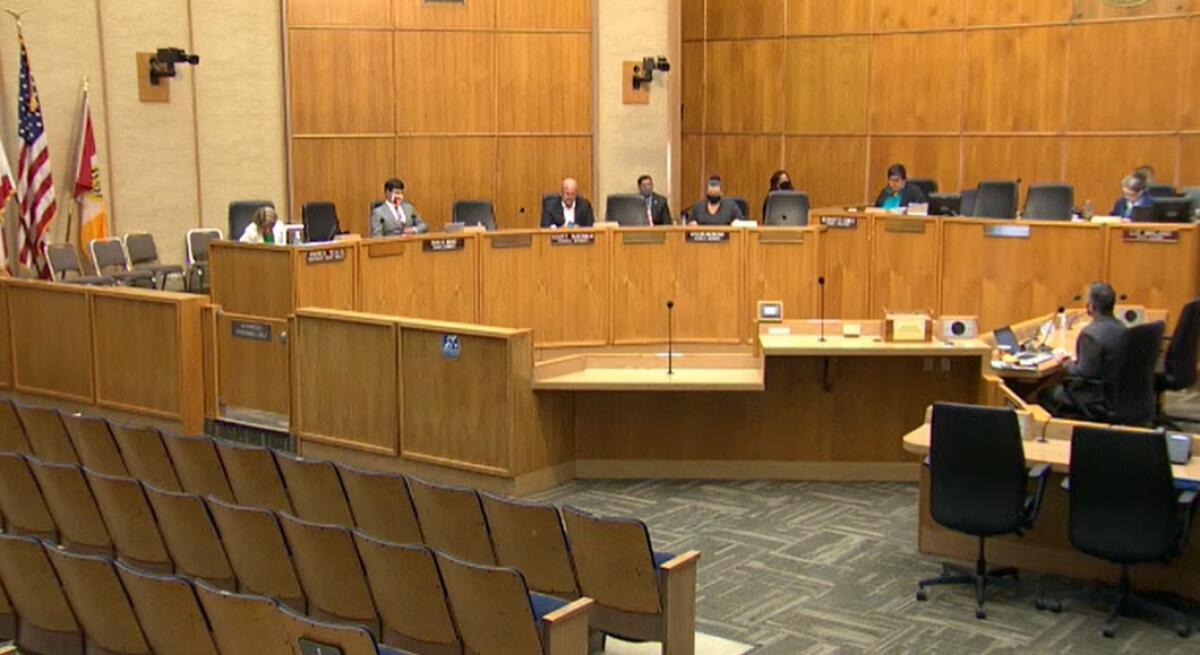San Diego votes to extend rent payments until Dec. 30

The City Council voted 5-4 to increase the time renters have to pay back rent that is owed. Mayor could still veto.
San Diego residents and businesses who have been struggling financially during the COVID-19 pandemic got a break Tuesday when the San Diego City Council agreed to extend rent repayments until Dec. 30.
The council voted 5-4 to extend the repayments under its moratorium on rental evictions, but will need a second vote before it can go into effect. The council action is also subject to the mayor’s veto. Under the previous plan, renters would have needed to start paying back rent in September.
Council members had first approved the moratorium in late March and have extended it twice since. The latest extension was prompted mainly by concerns that the city’s poorest residents who are out of work will not be able to quickly pay back rent owed from the last few months.
The new measure gives San Diego one of the longer repayment plans seen in the pandemic, even as moratoriums across the state, and locally, expire. Moratoriums in unincorporated San Diego County, San Marcos, Imperial Beach and La Mesa have all ended. Like San Diego’s, most of the eviction freezes required renters to prove their income was affected by the coronavirus, either through a loss of work or medical bills.
Council president Georgette Gómez said the coronavirus crisis is getting worse and renters needed more help considering some businesses have been closing and many schools would not be reopening in the fall. She had originally proposed extending the payback date to March 2021, but backed away from that after Councilwoman Jennifer Campbell proposed a compromise.
“Our economy is not fully restored,” Gómez said. “This is not an ideal policy, but it is a necessity.”
Councilwoman Barbara Bry said the city needed to pressure federal and state legislators for help for renters and argued the proposed extension could make the city vulnerable to legal actions from tenants rights lawyers. Councilman Scott Sherman said the best thing government could do is get people back to work and not saddle renters with a large amount of debt, as well as hurt small landlords.
“At the end of the day, it’s a bad thing for them because they still have the debt,” Sherman said of renters.
Bry and Sherman joined council members Kersey and Cate in voting against the extension.
Still, other members of the governing body said not granting the extension could increase homelessness at a time when residents need to stay safe in their homes.
“The pandemic is not going away anytime soon,” said councilwoman Monica Montgomery. “This is what we have to do.”
The council’s action, if it survives a second reading and a veto, still means the eviction moratorium expires Sept. 30. Tuesday’s vote only changes how long a renter has to pay back a landlord.
Public comments were mixed with landlords calling in to say they had been “held hostage” by renters who were not paying and the repayment extension would lower property values. But many renters also called to say they could not possibly pay back what was owed after months of not working.
Art Moses, of Rancho Peñasquitos, said he had invested in a condo with his mother-in-law and was already suffering with lost revenue.
“We have been beyond patient during this process,” he said. “It is difficult for me to understand why the council has not extended the rent (relief) program and provides it with more funding. I’m asking you not to approve this extension. It is unfair.”
In late June, the council approved a $15.1 million rent relief program for the city’s lowest income households. Priority is given to families with young children and households with at least one person 62 years old or older. The San Diego Housing Commission starting taking applications last week. The commission had received 6,227 finished applications as of Monday, but the program is only expected to have enough money for roughly 3,500 households.
Van Pham, with the Parent Voices San Diego group, said it would be better to cancel rent completely but, at the very least, the repayment period should be extended.
“Many people have been out of work and being evicted at this time could mean death,” she said. “Also, unemployment (benefits) do not help everyone, nor is it extended to everyone.”
Unemployment in San Diego County remained at record highs in June at 13.9 percent, but that period covered the time before California shut down much of its economy for a second time following an increase in COVID-19 cases. It is anticipated the jobless rate will increase in July.
Federal help with evictions is unlikely with the latest proposed Republican stimulus package not including any moratoriums. Many cities have enacted their own eviction protections, including Chicago, Los Angeles and Seattle. Statewide efforts have been implemented in Oregon and Illinois.
Unrest over rent has led to strikes and protests in San Diego and throughout the nation. A key argument of renters has been landlords have received federal mortgage relief but there is nothing in the law requiring property owners to work out payment plans with tenants, even though many have done so.
There could be more action on statewide rent relief in the next few weeks as the Senate considers a bill, SB 1410, that would give tax breaks to landlords for forgiving rents and not evicting tenants, while allowing renters 10 years to pay back rent to the state.
Get U-T Business in your inbox on Mondays
Get ready for your week with the week’s top business stories from San Diego and California, in your inbox Monday mornings.
You may occasionally receive promotional content from the San Diego Union-Tribune.
